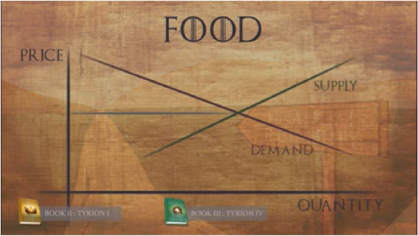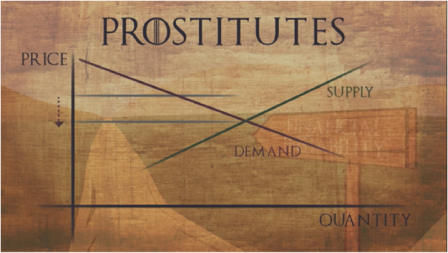Game of Thrones is a fantasy. However, this fictional world of George R R Martin is also a mirror to harsh realities of our world. With the warring noble families struggling to claim the Iron Throne, the economy of Westeros is at stake and is facing numerous challenges. Let’s review some of them.
- The Crown’s Debt
The Westerosi economy is an agrarian economy. The small folk is indulged in farming and rearing livestock. A very little portion of the revenue is generated from International Trade with the Free Cities. The condition of the economy began to deteriorate when The Crown’s debts started to mount after Robert Baratheon acquired the Iron Throne. In the books, Ned Stark mentions that the Mad King (Aerys Targaryen) left the treasury flowing with gold and Petyr Baelish managed to increase the revenue tenfold during his tenure as Master of Coins. However, ever since, The Crown has been spending and accumulating debts and this becomes detrimental when the borrowed money is not spent for long term growth of the economy. King Robert’s lust for wars, women, overly lavish parties and jousting competitions can explained as worthless with no returns and no savings.

In spite of the surplus left by the Mad King, the Crown is over 6 Million Dragons in debt. It owes 3 million Dragons to House Lannister, 2 Million to the Iron Bank and about a million to the Faith of the Seven (destroyed by Cersei). Reviewing the Debt Dynamics of The Crown, the probability of default is high. However, “THE IRON BANK WILL HAVE ITS DUES” means that the Iron Bank will be funding the rival forces’ claim to the throne which is not good news for Queen Cersei if she wishes to keep ruling. Since more debt isn’t an option, Lord Tywin levied heavy taxes on immigrants fleeing to KING’S LANDING and also levied taxes on brothels to generate more revenue.
Debt isn’t so bad if the economy is flourishing. However, there is no good news here either. The Crown’s expenditure must be on sustainable development of the region. Proper transportation facilities, efficient trade routes helps boost International Trade which in turn will only contribute to the growing economy. But with the conditions in Westeros, which include frequent wars and leadership changes, the possibility of implementation of public policies is in jeopardy.
WINTER IS COMING!

Westeros is characterised by extreme weather conditions, i.e., long summer followed by an even longer winter. ‘WINTER IS COMING’, this phrase also symbolises the army of the dead which is marching towards the North. With winter coming, let us examine how the market dynamics change in Westeros:
- Winters may last as long as 15 years in Westeros. Most of the Seven Kingdoms will be blanketed in snow and there will be no cultivation. Hence, even if King’s Landing cultivates sufficient food grains for the entire kingdom, in such a condition, the supply for food grains will be low. However, Tyrells occupied ‘The Reach’, which is a fertile region that doesn’t witness snowfall even during winter and hence, farming can be done in all seasons. As a result of this, the demand for the food grains will increase massively, which in turn will also shoot up the prices of the same with supply remaining constant. This will lead to inflation in King’s Landing as they’ll have to import food from The Reach.


- The negative economic growth in Westeros will result in a price hike and this will increase unemployment. As a result, it can be said that with continuously increasing unemployment, the price for various services will fall. For instance, the supply of prostitutes will increase owing to lack of employment opportunities. The women will resort to doing any job in order to support their families. However, due to unemployment, people’s discretionary expenses will evaporate and at the same time the demand for companionship (i.e., the lack of ability to pay) will decrease too. Therefore, the price to be paid for these services will be drastically affected as well.


- With the Army of White Walkers marching towards the North, and with the fact that only Dragonglass weapons can destroy the White Walkers, Jon Snow doubles his efforts into convincing Daenerys of House Targaryen to let him mine the Mountain of Dragonglass located in Dragonstone. This is a significant development as the Dragonglass mines will be more valuable than the Gold mines owned by the Lannisters in future as more people come to know about its utility. The fear of white walkers will shoot up the demand for Dragonglass weapons. In future, Queen Daenerys can rightly levy heavy taxes on mining activities and generate funds by exporting them at extensively higher prices to other noble families of Westeros. This will also give her a strong financial backing in her quest to claim the Iron Throne too.

THE NIGHT’S WATCH
In the whole of Westeros, The Night’s Watch is the first to undertake efforts not only to come up with a strategy to defend the people from the Walkers but also strengthen the economy of the organisation under the leadership of Jon Snow.
The Night’s Watch has guarded the Wall for 8000 years and is politically neutral. However, in order to be truly neutral, the night’s watch needs income of it’s own. The watch is funded by the wealthy cultivating families. The Watch has a control over 19 castles and a tract of land called ‘The Gift’ and the dwindling population of the small folk and the brothers of The Night’s Watch has reduced agricultural produce in this region which in return has impacted their income. Jon Snow, as The Lord commander of the watch recognises that the organisation requires more tax-paying citizens and labourers to increase the income. In the book Dance of the Dragons, while bringing the wildlings to the other side of the wall, his idea is to repopulate the empty Gift region with the rescued wildlings and generate revenues from their farming and taxes to fund The Night’s Watch. He also plans on using every available human resource irrespective of their gender and age. Hence, Jon Snow is the only King (in the north) who is working on strengthening the economy.
(P.S- I do support Jon Snow’s claim to the Iron Throne)
In conclusion, in order to improve its economy, Westeros needs leaders who invest in manufacturing and technological developments. Westeros needs to prioritise productivity and economic development over lavish wedding celebrations, wars and competitions. So let us hope that the upcoming war between the living and the dead brings some good news for the Westerosi Economy like the establishment of a whole new economic system of and by THE NIGHT KING!!

– Anjali Sharma FYBA

This is excellent…. I never thought that one could explain economics in this perspective, though I have been a die hard fan
LikeLike